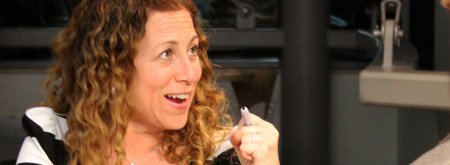Jodi Picoult's 'Keeping Faith'
Jodi Picoult is not an author to shy away from controversial topics. Her novels cover issues such as rape, suicide pacts and genetically chosen children. Keeping Faith is no exception to this, posing questions about life, death, faith and the existence of God.
Questioning Faith
Faith White used to be an ordinary seven year-old, living with her mother Mariah and father Colin in a large farmhouse in the small town of New Canaan, New Hampshire. However, her life is turned upside down when she and her mother unexpectedly return home one day to discover Colin with another woman. A quick divorce ensues.
Mariah starts to fall apart, but her supportive mother Millie encourages her to remain strong and focused on Faith. Mariah manages to pull herself together but is troubled when Faith starts talking to her imaginary friend ‘the guard’. Mariah decides to take Faith to a child psychiatrist, who concludes that Faith’s ‘guard’ is God and that their conversations may not be imaginary after all. Faith starts to reveal secrets about people that no-one else knows and she quotes from the New Testament, despite the fact that her mother is nominally Jewish and that Faith has never heard any Christian teaching. Faith then develops holes in her hands which the doctors believe are stigmata. Finally, Faith, without seeming to understand how, brings her own grandmother back from the dead, heals a baby from AIDs and starts to perform other miracles.
Mariah is at her wits’ end trying to protect Faith from the media moguls and religious groupies who have permanently encamped outside their home. Mariah also has to deal with the Catholic Church which decides it has jurisdiction over Faith because of her stigmata. Mariah proves herself to be resilient until Colin sues for custody, claiming that Mariah, herself, is harming Faith and coaching her to see visions as an attempt to gain attention.
Keeping Faith is about family, relationships, divorce and motherhood, but mainly it is about faith. Is Faith really a visionary, or is she just a scared little girl seeking shelter from her parents’ divorce? Is her mother using and harming Faith to gain attention for herself? Each character, and ultimately the reader, has to decide for themselves.
This is certainly a question that Ian Fletcher has to battle with. Ian is a self-professed ‘teleatheist’ whose production company ‘Pagan Productions’ aims to expose religious visionaries as hoaxes, and therefore disprove the existence of God. Ian’s rationalistic mind challenges his audience to ‘name one thing – other than the existence of God – that we take on blind faith’ (p. 84, UK paperback). It unfolds, however, that Ian’s objections to God are not entirely based on reason, but on his own difficult life experiences; he cannot believe in the concept of a loving God. As Ian gets to know Mariah and Faith, his assumptions are challenged. Despite his lack of faith, he hopes against hope that Faith can cure his autistic brother Michael, revealing that matters of faith are not always straightforward.
Faith’s vision of God shocks those around her because she believes she is seeing a female God. The Catholic priests sent to investigate Faith’s claims find this hard to stomach, whereas the ‘MotherGod’ sect who camp outside her home make Faith the champion of their cause. Faith’s God does not appear to be the God of the Old or New Testament, and Keeping Faith reflects on both the Catholic and Jewish view of God before appearing to reject both. The ultimate question of whether Faith is telling the truth is never answered; the reader is left to decide. It appears that Picoult is doing the same with the existence of God. The message of Keeping Faith is that the reader should decide who God is and whether God exists, according to their needs and circumstances at the time.
Is there any way to find out the truth about God? The Bible tells us that God is real, the creator of our universe and ruler of all things – whether we want to believe that or not. What we think does not change the truth of his existence. The Bible also shows that God has not hidden himself so that we must search for him and decide for ourselves what he is like. God came to earth as the man Jesus Christ to reveal exactly who he is and what he is like. God walked on this earth and many eyewitnesses testified to this, giving us plenty of evidence on which to base our beliefs. Christianity is not about blind faith at all, nor is it about us imagining a God who suits our circumstances, but centres on the factual evidence of Jesus’s death and resurrection. God longs for each one of us to turn to and trust in him as he is revealed in the Bible, and has given us all the facts and evidence we need to do this. This is a God we really can put our faith in. What response will you make to the evidence that points us to the living, loving God?
Book title: Keeping Faith
Author: Jodi Picoult
Keywords: Faith, God, belief, trust, doubt, motherhood, love, religion
Publisher (h/b): William Morrow (USA); Hodder & Stoughton (UK)
Pub. date (h/b): 5 May 1999 (USA); 16 January 2006 (UK)
Publisher (p/b): Harper Perennial (USA); Hodder & Stoughton (UK)
Pub. date (p/b): 25 April 2000 (USA); 16 January 2006 (UK)
© 2007 Louise Crook



